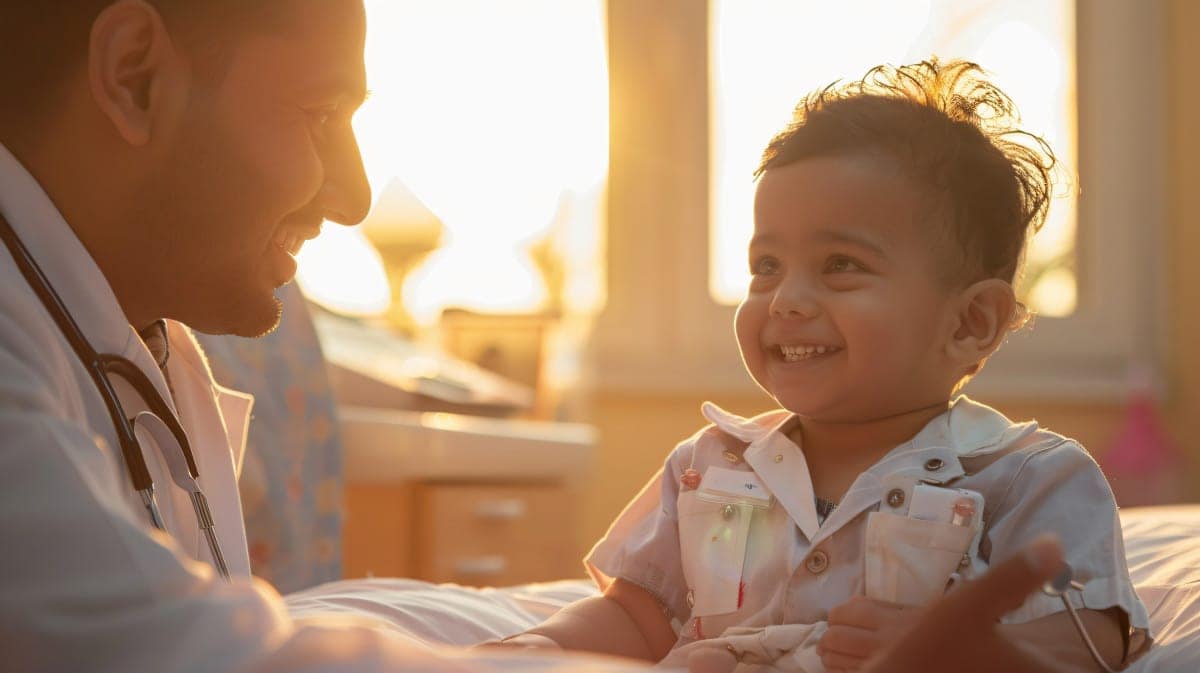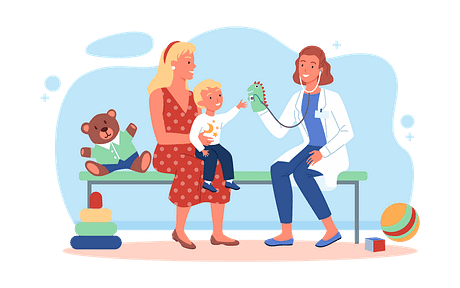
What to Expect During Your Baby’s Ninth Well-Child Visit ( 24 Months Old)
Your child’s 24-month well-child visit marks a crucial point in their developmental journey, offering an opportunity to assess their physical, emotional, and cognitive growth. During this visit, the doctor will evaluate your child’s health, address any concerns, and provide guidance on nutrition, safety, and developmental milestones. It’s a comprehensive check-up to ensure your child is thriving and on track.

38 Key Points to Expect During the Ninth Well-Child Visit
- Identify New Risk Factors: The doctor will inquire if any new risk factors have arisen for your baby or your family since the last visit.
- Diet and Feeding Concerns: The doctor will ask about your child’s diet, including the quantity and quality of food intake, breastfeeding, and any concerns regarding food fussiness. If necessary, the doctor may observe a feeding session. You will also discuss food safety practices.
- Toilet Training Concerns: Be ready to discuss any challenges or concerns you may have about toilet training.
- Screen Time: The doctor will ask how much screen time your child is exposed to and provide guidance on managing it effectively.
- Sleep Hygiene: You will discuss your child’s sleep patterns and any concerns regarding sleep.
- Childproofing at Home: You will be asked about the safety of your child’s sleeping environment, furniture, play areas, toys, and safeguards when playing outside.
- Growth Measurements: Your child’s weight, length, and head circumference will be measured and plotted on the growth chart.
- MCP Card Review: If your child’s MCP card isn’t fully completed, the doctor will help fill it out and interpret the data.
- Vision and Hearing Concerns: The doctor will ask if you’ve noticed any concerns about your child’s vision or hearing.
- Involvement in Daily Tasks: You’ll be asked whether your child is helping with activities like feeding, dressing, undressing, bathing, and grooming.
- Parent-Child Bonding: The doctor will observe your interactions with your child, focusing on your responsiveness to their cues and movements.
- Separation Anxiety: The doctor will observe how your child reacts when you leave and return.
- Play and Interaction: The doctor will watch how you and your child play together. If play isn’t initiated, the doctor might suggest activities. They’ll also observe how you communicate and comfort your child, especially after immunization.
- Review of Previous Visit: The doctor will go over notes and specific instructions from the last visit.
- Checklist Review: The doctor will review the office staff’s checklist to focus on important areas for your child’s development.
- Health Concerns: You’ll be asked if you have any new health concerns about your child.
- Behavioral Concerns: If there are any concerns about your child’s behavior, the doctor will discuss them and offer guidance.
- Responding to Unacceptable Behavior: The doctor will ask how you respond to non-acceptable behavior and provide tips if necessary.
- Playing with Your Baby: The doctor will ask how both you and your partner play with your child and offer guidance on effective play strategies.
- Talking with Your Baby: You will discuss how you and your partner communicate with your child.
- Encouraging Smiles: You may be asked how you make your child smile and engage them in joyful interactions.
- IAP-PSQ-4 Questionnaire: At the end of the consultation, you will be asked to fill out this questionnaire to assess parenting stress.
- Growth Chart Interpretation: The doctor will review your child’s growth chart with you and explain the trends in their growth.
- General Physical Examination: The doctor will examine your child for common issues such as anemia, rickets, and tooth eruption.
- Systemic Examination: A detailed physical exam will be performed to assess your child’s overall health.
- Neurodevelopmental Assessment: If any concerns arise from the MCP card, the doctor will perform a neurodevelopmental assessment.
- Vision Check: If it has been a year since the last vision screening, the doctor will check for issues like squint or red reflex problems.
- Hearing Check: The doctor will assess your child’s hearing by observing how they respond to various sound levels and distances.
- Signs of Abuse or Neglect: The doctor will look for any red flags that could indicate neglect or abuse.
- Immunizations: Your child will receive any necessary immunizations during the visit.
- Encouraging Self-Feeding: The doctor will support the continuation of breastfeeding, responsive feeding, and maternal diet supplements. They’ll encourage self-feeding with finger foods and allow messiness during meals. You will also be advised to avoid junk food and ensure proper nutrition during sickness.
- Developmental Activities: The doctor will offer advice on age-appropriate developmental activities according to the MCP card.
- Emotional and Behavioral Cues: You will be guided on how to recognize and respond to your child’s verbal, non-verbal, and emotional cues. The doctor will suggest methods to help your child regulate their behavior using tone, body language, and facial expressions.
a. Play Activities: The doctor will encourage you to take your child to the playground and engage in supervised activities. They may suggest games like hide and seek, and provide creative activities like drawing, scribbling, and pretend play using dolls or toys.
b. Communication Development: You will be advised to point out objects, name surroundings, and teach simple phrases. Encourage to-and-fro conversations and read storybooks together to improve communication.
- Building Independence: The doctor will suggest ways to encourage your child’s independence in daily activities like feeding, dressing, and bathing. Involve them in simple household chores to build responsibility.
- Personal Hygiene: You will receive guidance on teaching your child about personal hygiene, including skin and teeth care.
- Accident Prevention: The doctor will provide tips on preventing accidents at home, such as falls, burns, and choking hazards.
- Recognizing Danger Signs: You will learn about warning signs that require medical attention and what to do in emergencies.
- Next Immunization: The doctor will discuss the next round of immunizations with you.
This visit is an important opportunity to assess your child’s health and development at 24 months. This guide will help ensure that you’re prepared to discuss your child’s growth, development, and any concerns you may have during this crucial check-up.










































